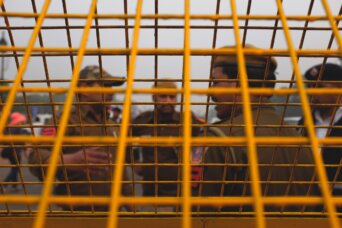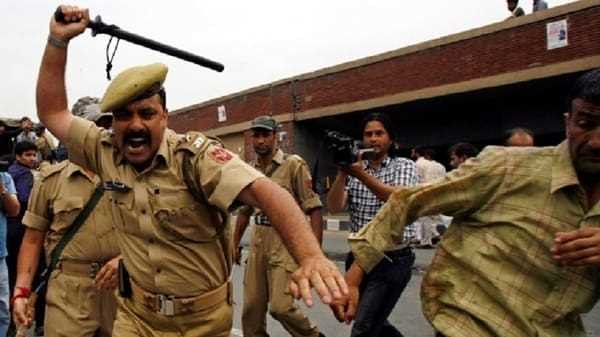- About
- Topics
- Story
- In-Depth
- Picks
- Opinion
- News
- Donate
- Signup for our newsletterOur Editors' Best Picks.Send
Read, Debate: Engage.
| topic: | Islamophobia |
|---|---|
| located: | India |
| editor: | Tish Sanghera |
Through the shaky lens of a cell phone camera, a viral video circulating on social media shows armed police harassing villagers in India’s tea-growing state of Assam. The policemen then open fire on a muslim man in his early 30s armed with a bamboo stick and wearing a simple cotton vest. He drops to the ground as a bullet wound appears on his chest. Seconds later, an unidentified man - later revealed as a cameraman - bolts onto the scene and stomps on the dead body. He does this twice before officials lead him away.
Though the video is one of the most graphic I’ve ever seen, it lacks the ability to shock anymore.
The victim of this clash was deemed an ‘illegal settler’ by officials of the state ruled by the Bharatiya Janata Party (BJP) - Prime Minister Modi’s party. According to them, the offenders had encroached on the land and were illegally occupying it, hence the eviction order. A young boy, Shakh Farid, also died in the clash with the police; barely twelve-years-old, he had just hours earlier secured an Aadhaar card - a vital proof of identification which listed his soon-to-be demolished home as a valid address.
Leaving aside the nationalist politics of the eviction drives in Assam, which must be viewed in the context of the BJP’s attempts at sustained disenfranchisement of India’s muslim community - such as the contentious National Register of Citizens (NRC) - the villagers’ deaths are an important window into a worrying and pervasive culture of hate and impunity in India today.
Mainstream media coverage of the events in Assam was as expected: sparse and one-sided. In a country where Muslims have recently been blamed for everything, from intentionally spreading the coronavirus, marrying Hindu women in order to forcibly convert them or buying land in Hindu majority areas to slowly take them over, an unbiased reading of the events has become impossible.
In recent months, right wing Hindu extremists - regularly legitimised and actively supported by the ruling party - have stepped up their incendiary hate campaigns against the muslim minority. Radical groups held mass rallies in India’s capital last month, openly calling for the “mass slaughter” of muslims. Thousands marched through Chattisgarh state armed with swords and batons, attacking and vandalising Muslim neighbourhoods. A year and a half ago, Delhi saw its worst riots in decades in which gangs targeted Muslim homes and businesses. Despite CCTV footage and multiple reports filed, the Delhi police’s investigation has been a sham.
Will any charge be put against the cameraman stomping with such zeal and excitement on the dead body of an unarmed protestor? It’s unlikely. The voices outraged at such a scene are either outnumbered or drowned out by those radicalised by years of hate speech and misinformation.
It’s not just Muslims who are victims of such impunity: in another disturbing video, farmers protesting against the government’s reformed farming laws were killed this week by an envoy of cars, one of which belonged to a BJP minister’s son, which ploughed into them. The government has already defended the minister and stated he will not resign.
Each month it seems there is a new video on social media with disturbing violence, hate and rage on display. Each month though, Indians become increasingly desensitised to its effects and the deadly cycle continues.
Image by mmamontov

